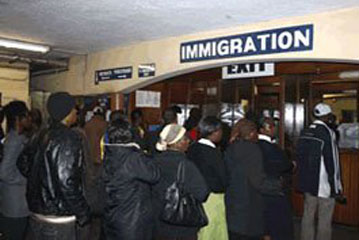
THE Zimbabwe Revenue Authority’s (Zimra) Asycuda Plus online system has once again collapsed, raising fears of chaos during Easter when thousands of holidaymakers throng Beitbridge Border Post on their way to Zimbabwe from South Africa.
BY OWN CORRESPONDENT
The system is used for online pre-clearance of goods, issuance of road access fees payment and processing of temporary import permits [TIPs] for vehicles Sources yesterday told The Standard the system broke down four days ago, barely four months after another major collapse last year when the country lost millions of dollars due to the faulty system.
“They said they were upgrading the system and all of a sudden we could not access it,” said a source employed by a shipping company.
“We have been failing to submit our bills of entry and some goods are stuck at the border.”
In December the system went down for a month during which time customs and excise operations were done manually.
It is difficult to monitor imported commercial goods’ movement with a manual system, which is porous.
The oncoming Easter holidays are popular with many South Africa-based Zimbabweans who are expected to come home through Beitbridge for the first break after the festive season.
- Chamisa under fire over US$120K donation
- Mavhunga puts DeMbare into Chibuku quarterfinals
- Pension funds bet on Cabora Bassa oilfields
- Councils defy govt fire tender directive
Keep Reading
Motorists are advised to apply for their TIPs online to avoid delays, but that is only possible if the Asycuda Plus system is working.
During a stakeholders’ meeting last Thursday to prepare for crowds expected at Easter, Zimra officials said some officers would be deployed on the South African side to direct travellers on how to proceed once in Zimbabwe.
“We are having additional staff despatched from other inland offices to help speed up movement of travellers,” said a Zimra representative.
The official said traffic would be separated through creation of trucks, green and red routes and a side for pedestrians taking advantage of ongoing developments to speed up movement.
Government in January released $9,3 million for immediate setting up of facilities to rid the border post of bottlenecks and put in place a conducive working environment for border officials.
Already a new fence to shut out touts, vendors, pickpockets and smugglers is under construction on the south side of the border where they exploited a fallen fence near the Zimbabwe duty-free shop to gain entry.
In December last year Zimra, whose system was down, succumbed to crowd pressure until the Zimbabwe National Army moved in to assist with crowd control.
Despite criticism from the public, the army has remained on the border where order has been restored, but not without disgruntlement from other stakeholders who feel the border post is not for the military but for the police to control.
Efforts to get comment from Zimra were fruitless yesterday.










